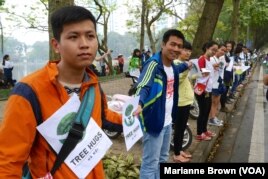23 March, 2015
Many people in Hanoi have expressed anger about the government’s plan to cut down thousands of the city’s trees. They have protested around the city and on social media. A Facebook page titled “6,700 people for 6,700 trees” set up last Tuesday has already received nearly 50,000 "likes."
The plan, at the cost of $3.4 million, involved cutting down 6,700 of Hanoi’s trees. According to the newspaper Thanh Nien, the trees, more than a quarter of all the trees in the city, are considered dangerous and unattractive. The newspaper questioned what would be done with the timber – or wood from the trees. Timber is considered highly valuable in Vietnam.
Last Friday, after 500 trees had already been cut, the chairman of the Hanoi People’s Committee announced that the tree-cutting plan would be suspended.
On Sunday, about 500 people held hands outside a park in Hanoi to protest the plan. They wore special t-shirts and carried signs with the words “Tree Hugs Hanoi.”
Protester Duc Anh said many people were worried about the plan. He said Hanoians and tourists love the city’s trees for many reasons. They are good for the environment. He also said many people feel an emotional connection to the trees. Many of the trees are as old as his grandparents.

Participants hold hands at a demonstration in Hanoi opposing a plan to cut down around a quarter of the city's trees, March 22, 2105. (Marianne Brown/VOA)
On Facebook, many Hanoians wrote about the trees’ special place in the city, as well. Student Vu Thanh Phong said the trees were one of Hanoi’s great assets. He said the trees are part of what makes Hanoi unique. Without them, the city would not be as special.
About a quarter of Vietnam’s population uses Facebook. The site has become a powerful tool for social change. Several protesters at the Tree Hug event wore t-shirts connected to a different campaign, which also began on social media. The campaign called on officials in central Vietnam to stop a plan to build a cable car in Son Doong, one of the world’s largest caves.
Thanh Thu was part of that campaign. He said the attention on Facebook helped make the government rethink the project.
“When they considered the factor of environment and economy and they saw that Son Doong should be protected ... they will not build anything until 2030,” he said.
Thanh Thu says he hopes social media campaigns like this will encourage people to think more about other people. He hopes people will become more active in protecting the environment.
I'm Ashley Thompson.
VOA correspondent Marianne Brown reported this story from Hanoi, Vietnam. Ashley Thompson wrote it for VOA Learning English. Hai Do was the editor.
Do you sometimes use sites like Facebook to encourage social change? Write about one such experience you have had with social media!
_____________________________________________________________
Words in This Story
unattractive – adj. not beautiful, interesting, or pleasing
unique – adj. very special or unusual
cable car – n. a vehicle that hangs in the air from a cable that pulls it up and down mountains
campaign – n. a series of activities designed to produce a particular result